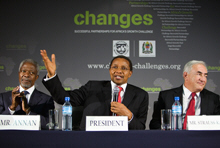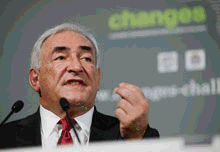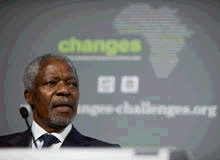
Typical street scene in Santa Ana, El Salvador. (Photo: iStock)
IMF Survey: IMF Pledges to Help Africa Get Through Global Crisis
March 10, 2009
- Strauss-Kahn offers to be voice for Africa at global crisis talks
- Africa likely to be hard hit by economic downturn, trade slump
- Says world facing a “Great Recession” of below-zero growth
The IMF pledged to help Africa get through the global economic crisis by providing extra funding and technical assistance, and offered to be the voice of Africa at coming talks of major industrial and emerging market countries in London convened to agree ways to combat the worldwide trade and business slump.

Tanzanian President Kikwete (c) at conference, with former UN secretary general Annan (l), IMF Managing Director Strauss-Kahn (photo: Stephen Jaffe/IMF)
Launching a two-day conference of African financial officials, business leaders, and academics in the Tanzanian city of Dar es Salaam, IMF Managing Director Dominique Strauss-Kahn said that the meeting was being held at a critical juncture, with the world facing what he dubbed a “Great Recession.”
“The IMF expects global growth to slow below zero this year, the worst performance in most of our lifetimes. Continued deleveraging by the world’s financial institutions, combined with a collapse in consumer and business confidence, is depressing domestic demand across the globe. World trade is falling at an alarming rate, and commodity prices have tumbled,” he told attendees at the opening plenary, also addressed by Tanzanian President Jakaya Kikwete.

Kikwete: “There should be no untouchable countries when it comes to financial impropriety and lack of effective regulatory framework” (photo: Stephen Jaffe/IMF)
“Even though the crisis has been slow in reaching Africa’s shores, we all know that it is coming—and its impact will be severe. This ‘third wave’ of the crisis, which is hitting low-income countries, will depress economic growth, put budgets under strain, and weaken external accounts. And the threat is not only economic: there is a real risk that millions will be thrown back into poverty,” Strauss-Kahn said in prepared remarks.
Kikwete said the crisis threatened to reverse or even wipe out the socio-economic gains made by Africa in recent decades.
Speakers at the March 10–11 conference include Benno Ndulu, Governor of the Bank of Tanzania; Trevor Manuel, Finance Minister of South Africa; Youssef Boutros-Ghali, Finance Minister of Egypt; Yuan Chen, Chairman of the China Development Bank; Jeffrey Sachs, professor at Columbia University; Angel Gurria, Secretary General of the Organization for Economic Cooperation and Development; and Kofi Annan, former secretary general of the United Nations.
Input to G-20
The conference is taking place ahead of the meeting of the Group of Twenty (G-20) leading industrialized and emerging market countries in London on April 2. The conference will follow up on an action agenda agreed last November in Washington to try to get the world economy out of the current tailspin.

Strauss-Kahn: voices of poor who will be worst hit by crisis must be heard. “We must ensure that Africa is not left out” (photo: Stephen Jaffe/IMF)
Strauss-Kahn said he had been encouraged by the leadership role taken by the G-20 to provide a policy response to the crisis. But he said he was concerned that the grouping was not well equipped to hear the voice of Africa, or more generally, low-income countries.
“I therefore see this conference as an excellent platform for African countries to convey key messages to the G-20 Leaders Summit being held in London next month. In this conference, the IMF can be your voice,” he declared.
Annan, also addressing the plenary, urged that Africa should be fully represented in discussions on reforming the global financial architecture, including negotiations on regulation of the global financial system. “It is not enough being occasional guests at exclusive Club meetings,” he said.
Tanzania seen as example
Strauss-Kahn said Tanzania provided a good example of Africa’s recent success story. “Twenty-five years ago, it was an economy in severe distress, plagued by widespread shortages and high inflation. Today, Tanzania looks radically different: inflation is under control, and economic growth has averaged 7 percent a year since 2000, increasing real per capita income by 50 percent.
“At the heart of success lies Tanzania’s home-grown development strategy, MKUKUTA,” he said. “This has anchored the nation’s commitment to economic stability. It has also catalyzed significant donor support and attracted foreign direct investment, which has risen to 4 percent of GDP per year.”
Annan’s message was also spelled out by Kikwete in his opening speech. The Tanzanian President said the impact of the crisis goes beyond the borders of the nations responsible. “It is therefore important that creating effective mechanisms for surveillance of the international and national financial systems should be a matter of global interest. We too in Africa, though poor, have profound interest in the matter.
He said the mandate of the IMF for surveillance of economies should be strengthened. “In carrying out this role, evenhandedness is very important. There should be no untouchable countries when it comes to financial impropriety and lack of effective regulatory framework because its consequences affect all of us.”
Warning of civil unrest
Strauss-Kahn said the voices of the poor who will be worst hit by the crisis must be heard. “We must ensure that Africa is not left out. This is not only about protecting economic growth and household incomes—it is also about containing the threat of civil unrest, perhaps even of war. It is about people and their futures,” he stated.
In an analysis released ahead of the conference, the IMF said that economic growth in sub-Saharan Africa is expected to slow to 3¼ percent in 2009 from 5 percent in 2008—half of what was expected a year ago.
Strauss-Kahn said that with growth around the world coming to a virtual standstill, demand for Africa’s products is plunging. Tourism revenue is also likely to decline as consumers around the world are tightening their belts, and trade financing and investment flows have become scarcer.
Need for more funding
While some African countries were better placed than in the past to weather the crisis, many African economies will need significant additional concessional financing to get through. The IMF projects that the 22 most vulnerable low-income countries—many of which are in Africa—will require at least $25 billion in additional concessional financing this year alone to keep their foreign reserves at safe levels. If global economic and financial conditions deteriorate further, the financing need will be significantly larger.
Strauss-Kahn called on the international community to both help Africa and avoid protectionist measures that could harm the continent. The IMF, he said, would move quickly to provide African members with the financial resources they need. Last year, the IMF backed countries suffering from the food and fuel price shocks, reaching 15 new financing agreements with African member countries in 2008—up from only four in 2007—and increased access under 8 existing arrangements.

Annan: African countries need dramatic increase in concessional lending and temporary financial support to help them cope (photo: Stephen Jaffe/IMF)
Former U.N. secretary general Annan said that Africa could be part of the solution by including it in a global stimulus plan that would create jobs and promote economic activity. But African countries needed a dramatic increase in concessional lending and temporary financial support to help them cope. The trillions of dollars found to bail out companies and stimulate the economies of advanced countries undermined the claim that money could not be found to fight poverty.
Double concessional lending
Looking ahead, Strauss-Kahn said his goal was to at least double the IMF’s concessional lending resources. “I urge partner countries to support me in this, so that additional resources for Africa can be available as soon as possible. I am hopeful that significant progress on this front can be made in the near future,” he stated.
The IMF was trying to increase the flexibility of its financing by exploring better ways to provide short-term financing to members facing immediate financing needs. Raising access limits, which have become increasingly binding, is also under discussion. The IMF is also trying to streamline conditionality, and tailor it better to the circumstances of each individual country.
The IMF also wanted to strengthen ownership of the Fund. “Specifically, we need to implement recent agreements on rebalancing quota shares, and also agree on a timetable for the next stage of quota reform. I am hopeful that both can be achieved this year—with welcome consequences for amplifying the voice of our African members,” Strauss-Kahn added.
Comments on this article should be sent to imfsurvey@imf.org


